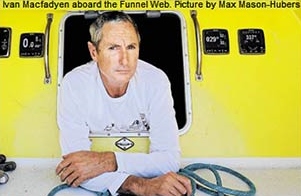http://www.asyura2.com/14/genpatu41/msg/334.html
| Tweet |

(EneNews)

Sailor talks Fukushima’s Impact on Pacific: “It’s dead… for thousands of miles there was nothing” between US & Japan — “Like sailing in a dead sea… everything’s all gone” — “Just talking about it makes me feel like I want to cry” — “No birds, no fish, no sharks, no dolphins, no turtles, nothing” (AUDIO)
船乗り(ヨットマン)は太平洋上における福島の影響を語る:米国と日本の間で「それ(太平洋)は死んだ...数千マイルの間(生きているものは)何もありませんでした」−「死の海を航海している様だ...何もかも全てが無くなっていた」−「そのことについて話していると、私は泣きたいように感じるだけだ」−「鳥はいない、魚はいない、サメはいない、イルカはいない、カメはいない、何もいない」(音声)
Published: October 23rd, 2014 at 3:00 pm ET
公開日:2014年10月23、午後3:00 ETで
Excerpts from newly uncovered interview with yachtsman Ivan Macfadyen:
新たに発見された、ヨットマンのイワン・マクファーデンとのインタビューの抜粋:
・Ivan Macfadyen:We started Melbourne and we went up to Osaka in Japan… the race is run roughly every four years. I did it in 2003 and again now in 2013.Navigation-wise,I sailed over exactly the same compass headings as what I had 10 years ago... [2003] it was full of life, the sea was vibrant…it was very interesting from the point of view that I could catch a fish every day…[2013] in the whole 5,500 [nautical] miles we caught 2 fish.
・イワン・マクファーデン:私たちはメルボルンを出発し、日本の大阪まで行きました...レースはおよそ4年ごとに施行されます。私は2003年に行い、そして2013年に今再びそれを行いました。ナビゲーションに方向を示されて、私は10年前に持っていたものと全く同じコンパスの進路上を航海しました... [2003年に]それ(太平洋)は生命に満ちていた、海は活気に満ちていた...私は毎日魚を捕まえることができるという観点から、それは非常に興味深いものでした...[2013年に]全5500[海里]マイルの内で、私たちは魚を2匹捕まえた。
・Q: What about sea birds and all of that ?
・質問:海鳥と全ての鳥についてははどうですか?
・Macfadyen:As you get closer up to Japan they’re not there anymore. They’re gone, it’s just like sailing in a a dead sea… there is nothing, there isn’t anything there…
・マクファーデン:あなたが日本に近づくにつれて、それらはもう何もありません。それらは無くなっている、それは正に死んだ海を航行するようなものだ...何も無い、そこには何もありません...
・Q: After Japan, you headed out into the expanse of the Pacific toward America… Did you see any impact from the radiation that’s leaked from the Fukushima nuclear reactors?
・質問: 日本を後にして、あなたはアメリカに向かって広大な太平洋に出向かった...あなたは福島の原子炉から漏れた放射能からの影響を確認しましたか?
・Macfadyen:It’s dead. That’s where I coined the phrase, ’The ocean’s broken−because, for thousands of miles, there’s nothing. No birds, no fish, no sharks, no dolphins, no turtles, nothing. I’m used to sailing and seeing all those things, and you kind of take them for granted. They’re just there, and suddenly they’re not there. So it’s more striking that they’re not there, all those beautiful creatures, they’re just all gone…
・マクファーデン:それ(太平洋)は死んだ。それが私の造り出したフレーズである、「海は壊れた−なぜならば何千マイル間に何も無いからである。鳥はいない、魚はいない、サメはいない、イルカはいない、亀はいない、何も居ない。私は航海に慣れている、それらのもの全てを見ている、そして あなた方は大体当然のこととして、それらを手に取る。彼らは正にそこにいる、と突然、彼らはそこにいない。ですから、それらがそこに居ないことが、より印象深いのだ、それら全ての美しい生き物、それらは全て消えている...
We had seen a whale, round about probably 1,000 miles south of Japan, just lying on the surface with like a big tumor on the side of it’s head, just behind its head. It was clearly, it looked like it was going to die, it was just lying there breathing in and out. It didn’t try to get away, it didn’t flap its tail, it didn’t do anything, it was just lying there. Clearly it was in distress, but we couldn’t do anything about that.
私たちは、日本の南方おそらく約千マイル周囲の鯨を見ていた、ちょうど頭側を大きな腫瘤のようにして(水)表面上に横たわっていた。それが死のうとしている様に見えたのは明らかだった それは丁度内呼吸と外呼吸をして横たわっていた。それ(鯨)は離れて行こうとしませんでした、尻尾をヒラヒラさせませんでした、何もしませんでした、そこに横たわっているだけでした。明らかにそれは苦痛な状態にあった しかし我々はそのことについて何もできませんでした。
・Q: How did it make you feel?
・質問:あなたはそれをどのように感じましたか?
・Macfadyen:Sick to the bottom of my stomach. I’m not an environmentalist… I’m just a normal person that’s just sailed around, not thinking about these issues, and it had such a profound effect on me… Just talking about it makes me feel like I want to cry.
・マクファーデン:私の胃の下部に病気がある。私は、環境保護主義者(環境問題専門家)ではない...私はただ、周りを航海している普通の人間だ、これらの問題について考えていない、そしてそれは私にそのような深遠な影響を与えた...そのことについて話していると、私は泣きたいように感じるだけだ。
Skeptoid (emphasis added): This is the third in a series of pieces debunking the scaremongering and hysteria regarding the disaster at the Fukushima nuclear plant… The ocean is broken. This is the title of an October article from Australia’s Newcastle Herald, chronicling the journey of Ivan Macfadyen [The Sidney Morning Herald]… it went viral, with over half a million views in three days.
スケプトイド(強調は記者):これは、福島原子力発電所での災害に関するデマやヒステリーを暴く作品の第3シリーズである... 海が壊れています。これは、オーストラリア・ニューカッスルヘラルド(新聞社)からの10月記事タイトルである イワン・マクファーデンの旅を年代記にしました [シドニーモーニングヘラルド] ...それはバズっている(流行している、話題になっている、ネットで多数アクセスされている)3日間の中で50万人以上の閲覧があった。
People connected the dots and linked the dead, garbage-filled ocean that Macfadyen encountered on his trip to Fukushima and the piece has been used as part of the exaggerated story since then. But the link between the two doesn’t appear to exist… The story is also not at all about the nuclear plant, but the damage done from overfishing and plastic pollution.
人々は、マクファーデンが旅行で遭遇した、死んでゴミに満ちた海を、福島と点を繋いでリンクした、そして作品は、それ以来誇張されたストーリーの一部として用いられています。しかし、2点間の繋がりは存在しないようです...物語は、原子力発電所についてでは全くなく、ダメージは乱獲やプラスチック公害からきている。
See also: After we left Japan, it felt as if the ocean itself was dead – Nothing alive for 3,000+ mi.
参照:私たちが日本を去った後、海自体が死んでいたかのように感じられた−3,000マイル間以上、生きているものは何もない
Full interview with Macfadyen here
ここでマクファーデンとの完全なインタビュー
|
|
|
|
▲上へ ★阿修羅♪ > 原発・フッ素41掲示板 次へ 前へ
|
|
 スパムメールの中から見つけ出すためにメールのタイトルには必ず「阿修羅さんへ」と記述してください。
スパムメールの中から見つけ出すためにメールのタイトルには必ず「阿修羅さんへ」と記述してください。すべてのページの引用、転載、リンクを許可します。確認メールは不要です。引用元リンクを表示してください。